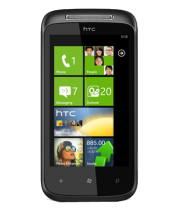WP7 and the F-word

No, not THAT F-word! Or that one. And definitely not that other one you're thinking of! The F-word that I'm see increasingly being linked with Microsoft's latest Windows Phone 7 handset is "Failure." But can WP7 be called a failure so early on? Let's take a look at what we know and what we don't know.

But isn't no news, good news? Well, yes, but only when there's no news. We're now starting to get retailers and carriers coming out with information to support the idea that WP7 is struggling.
First off, UK retailer MobilesPlease.co.uk revealed that WP7 "got off to a sluggish start," accounting for 3% of smartphone sales and a little under 2% of overall sale. Symbian^3 handsets outsold Windows 7 Phones by 3 to 1 (with Symbian^3 sales consisting almost entirely of Nokia N8), while Android outsold WP7 by a whopping 15 to 1.
But its hardly surprising that Symbian^3 and Android are outselling WP7, given the brand recognition that these established players have. And as MobilesPlease.co.uk points out, there's little to differentiate WP7 from Android:
The windows phone 7 handsets -as nice as they are – are by and large generic phones from well known manufacturers, and in most cases an almost identical model is available from the same manufacturer with Android, and given the choice people seem to be picking Android.
But it gets worse. Australian carriers Telstra and Vodafone have admitted that sales are slow, with another unnamed carrier saying that sales are "disappointing."
A Telstra executive told ChannelNews that sales were "weak" and that demand for other phones including Blackberry, iPhone and HTC Android devices were in high demand.
Again, it's only a month down the line for WP7, but Microsoft did pour millions of dollars into the launch which one might have expected to have stimulated more interest.
And then there are the 2-for-1 deals for WP7 handsets. Fire sale already, or just Holiday season craziness? Hard to tell.
Launching a new product is more a marathon than it is a sprint, in which case there has to be a level of pacing to be able to keep an eye on the long game. But given the volume of new products being launched, combined with the Holiday silly season, products have less time than ever to get a foothold. If consumers don't embrace WP7, then developers won't invest the time, but without solid developer support, many consumers won't buy into the new platform, so that creates a Catch-22 situation where Microsoft ends up having to pour money into the project to keep it buoyed until a critical mass is achieved ... which isn't guaranteed.
There are also plenty of rumors surrounding the highly anticipated update to WP7, coming January. Rumor has it that it will be huge ... maybe. But again, without a healthy user base, developers will be wary of investing too much energy in the platform. And without developers making cool apps, power users will choose a more established ecosystem.
While I think it's unlikely that the WP7 will go the same way KIN did (dead, only to later reanimate be resurrected as a lower-cost, lower-featured Frankenphone that surely will only be available for a limited period), but it could very well join the ranks of the Zune.
Personally, I think that it's far too early to start using the F-word with relation to WP7. That said, if the platform fails to gain good market traction over the Holidays, Microsoft will undoubtedly need to pump more money and effort into promotion, and be content with scrabbling at the lower end of the market share for the foreseeable future.